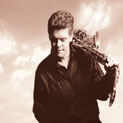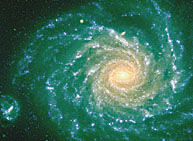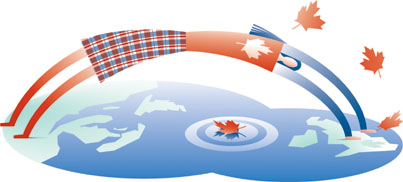Off campus
Jamming

"He plays like the devil," big band leader Vic Vogel once said of saxophonist Rémi Bolduc, who teaches at McGill and Concordia. Bolduc is known for his verve and intensity in performances, and he invites New York tenor sax sensation Seamus Blake to play with his jazzy ensemble Thursday, February 12. Here the master blowers at Salle du Gésu, 1200 Bleury, for $15 regular or $12 student. Call 861-4378 or see www.gesu.net.
Listening
Pulitzer Prize—winner John Corigliano comes to Concordia to discuss "Of Rage and Remembrance: AIDS and the Creative Process." Corigliano is an internationally celebrated composer best known for the soundtrack to The Red Violin. The Montreal Symphony Orchestra will give a premiere of his Symphony No. 1, "Of Rage and Remembrance," an impassioned response to the AIDS crisis.
This lecture is part of Concordia's ongoing HIV/AIDS Project, which started in 1993 as a lecture series and has grown to include an online version of their landmark course "HIV/AIDS: Social, Cultural and Scientific Aspects of the Pandemic."
Monday, February 16, 6:00 pm, 1455 de Maisonneuve Blvd. W., H-110. MSO concert: February 17 (including pre-concert discussion with Corigliano) and 18. For more info, call: 848-2424 ext. 7998.
Browsing

In space, nobody can hear your shutter click. Our universe is reputedly a commodious place, and the good folks at NASA are sharing it with you. Each day, a beautiful photo of stellar wonders is displayed on their Astronomy Picture of the Day site. A explanation of what's pictured is written by a professional astronomer, along with hyperlinked text that will take you through the site's archives to yet more spaced-out photography. Check it out: http://antwrp.gsfc.nasa.gov/apod.
An across-the-pond perspective

Tzigane
McGill Canadian Studies student Danielle Metcalfe-Chenail goes to a small country to think big about home
When people in Canada learn that I am a Canadian Studies student, most immediately ask, "Why?" Two and a half years into my degree I am now armed and ready for this question with a list of (what I hope are) pithy comebacks and carefully thought out replies. Since September 2003, however, I have been on student exchange in Leeds, England, and the script has changed. Now the question I get most often is "Why leave Canada, then?" Which is, of course, a very good question indeed.
Before I left Montreal for Leeds, I had it in mind that my mission was to be a sort of ambassador for Canada. I had packed my Canadian pride, my McGill bag and, most importantly, my Diana Krall, Great Big Sea and Cowboys Fringants CDs. I imagined myself answering questions about Canadian history and culture thoroughly and patiently and being careful not to be anti-American. With a semester under my belt, though, I've found the questions don't come often, people think my bag is from Scotland and it seems as though the English can't quite handle Quebecois music. So, I've changed tactics and now I fancy myself more an observer, recording information from my experiences both on and off campus.
Most of my courses to date at Leeds have had little to do specifically with Canada. In fact there's only one this year that mentions Canada in the title: a year-long comparative course on Canada and Siberia. This course is offered through the Slavonic Studies department and so of the seven-odd students enrolled (including me), six are pursuing a degree in Russian. And while several of them have been to Siberia, only the professor has travelled to Canada.
This professor, David Collins, has visited each province and territory and has vast numbers of maps and documents tucked away in his Government of Canada boxes and folders — a testament to his interest in our nation and his 20 years of teaching it to British students. He describes the course as an appreciation class on the two areas and knows that most students taking it know little to nothing about either land mass. I was drawn to the course mainly because I was curious how the English view Canada and Canadians and what they teach about us. So far, as we've examined the early topics of geography, exploration, fur trade, settlement and transportation, I've found that the Canadian content isn't much different from what first years at McGill might learn in the Introduction to Canada class. What has changed, however, is my reaction to this material as I sit with the other students who furiously scribble notes, trying to comprehend what is to them a completely foreign land.
My classmates — perhaps because of their newness to the subject — rarely ask questions or offer comments during Collins's lectures. Outside of lecture time, I've asked them what they think when they hear "Canada": Some are vaguely aware of the "French-speaking part" of Canada and most, it would seem, have a view of Canada as some large national park with lots of outdoorsy things to do. British Columbia looms large as a reference point and while these particular students do not think of Canada as a land of perpetual ice and snow, I have to admit I enjoy impressing them with tales of particularly bad winters (which, I own, might just be encouraging the old myths).
Outside of class, I've also had a chance to search out Canadian connections, especially north of the border in Scotland. The Scots, from my experience, have a great deal of interest in Canada, as many feel in part responsible for the course our history has taken and the development of the country. In Edinburgh, I came across an interesting exhibit at the Royal Museum of Scotland called "Trailblazers: Scots in Canada." I dutifully paid the admission fee and strolled through the darkened rooms with fur trade artifacts, woeful tales from the Highland Clearances and a wall of important Scottish-Canadian figures such as our intemperate Sir John A. I was also struck, while in Edinburgh and Glasgow, by how the Scottish seem to truly like Canadians; I spoke to several who were continuing the theme of migration from Scotland to Canada in the present day, including one man who was moving to Calgary with his wife.
The past few months have offered me a lot of opportunities to compare and contrast Canada with other countries, in a way that I most likely could not have done if I'd stayed at home. By travelling and making friends with students from Germany, Austria and other European nations I've learned a lot about how the world views us. I think my conception of Canada is evolving with each new person I meet, every discussion I have, and each new place I visit. Also, being at a distance, I feel my fondness for Canada growing — perhaps it is only natural to become more attached to your country (like people) when you are away from it. All I know is, while this year abroad is teaching me a lot of valuable lessons about our place in the world, it has also made me realize there really isn't anywhere else in the world I'd rather live.
